高考英语总复习:状语从句
高考英语 14种从句用法总复习之状语从句用法
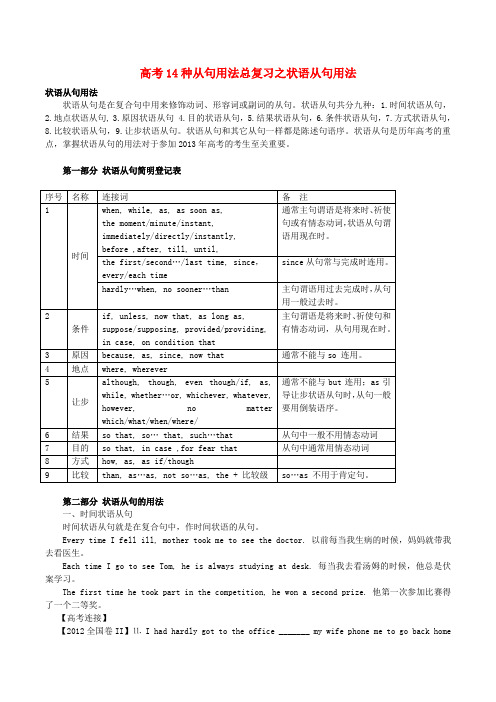
高考14种从句用法总复习之状语从句用法状语从句用法状语从句是在复合句中用来修饰动词、形容词或副词的从句。
状语从句共分九种:1.时间状语从句,2.地点状语从句, 3.原因状语从句 4.目的状语从句,5.结果状语从句,6.条件状语从句,7.方式状语从句,8.比较状语从句,9.让步状语从句。
状语从句和其它从句一样都是陈述句语序。
状语从句是历年高考的重点,掌握状语从句的用法对于参加2013年高考的考生至关重要。
第一部分状语从句简明登记表第二部分状语从句的用法一、时间状语从句时间状语从句就是在复合句中,作时间状语的从句。
Every time I fell ill, mother took me to see the doctor. 以前每当我生病的时候,妈妈就带我去看医生。
Each time I go to see Tom, he is always studying at desk. 每当我去看汤姆的时候,他总是伏案学习。
The first time he took part in the competition, he won a second prize. 他第一次参加比赛得了一个二等奖。
【高考连接】【2012全国卷II】⒒ I had hardly got to the office _______ my wife phone me to go back homeat once.A. whenB. thanC. untilD. after 【答案】A【2012安徽】30. When ________ for his views about his teaching job, Philip said he found it very interesting and rewarding.A. askingB. askedC. having askedD. to be asked 【答案】B【2012山东】27. He smiled politely _______ Mary apologized for her drunken friends.A. asB. ifC. unlessD. though 【答案】A【易错提醒】1、主句的谓语动词是将来时、有情态动词或祈使句,以when, before, after, till, until, as soon as, the moment/minute/second, immediately, instantly, directly等引导的时间状语从句中用一般现在时;如果要表达从句的动作已经完成,主句的动作才发生,从句中用现在完成时。
高考英语重要语法知识:状语从句

高考英语重要语法知识:状语从句定义:在句中作状语的从句是状语从句,修饰主句中的动词、形容词或副词等。
状语从句由从属连词引导,从属连词在句中不充当句子成分,只起连接作用,状语从句放在句首时,要用逗号,放在句尾时不用。
分类:根据意义上的不同,状语从句可分为:①时间状语从句②地点状语从句③原因状语从句④目的状语从句⑤条件状语从句⑥结果状语从句⑦让步状语从句⑧方式状语从句⑨比较状语从句一、时间状语从句引导时间状语从句的连词有:as, when(whenever),while, before, after, as soon as, until(till), since,every/each/next time, once.( as, when, while都有“当……的时候”,可以互用)◆When、While、as的区别:①when是at or during the time ,既指时间点,也可指一段时间,因此when引导的时间状语从句中的动词可以是终止性动词,也可以是延续性动词;while是during the time,只指一段时间,所以while从句中的动词必须是延续性动词。
②when说明从句的动作和主句的动作可以是同时,也可以是先后发生;when从句多用一般过去时while主从句动作或状态同时发生。
while从句多用过去进行时eg. When the teacher came in,we_____________________(talk).When the clock struck twelve,all the lights went out.When we arrived at the station,the train had left.While we _____________(have)supper,all the lights went out.While I was writing letters last night,he was watching TV.④when和while还可作并列连词when表示“就在那时”; while表示“然而”,表前后意思的对比。
高考英语考前玩转高频语法系列-状语从句
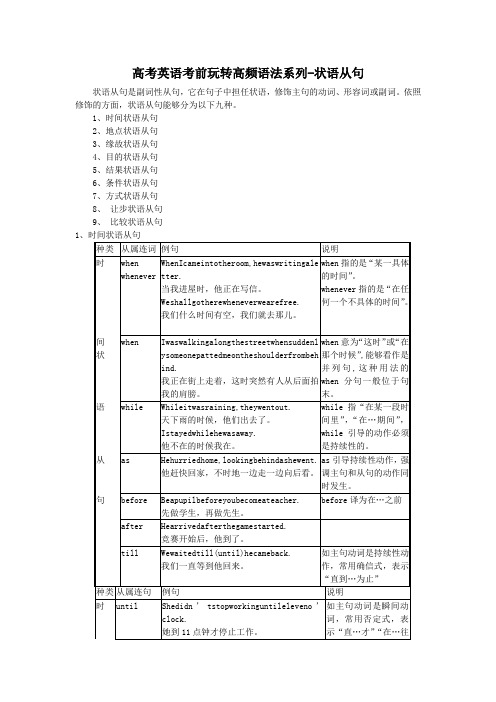
高考英语考前玩转高频语法系列-状语从句状语从句是副词性从句,它在句子中担任状语,修饰主句的动词、形容词或副词。
依照修饰的方面,状语从句能够分为以下九种。
1、时间状语从句2、地点状语从句3、缘故状语从句4、目的状语从句5、结果状语从句6、条件状语从句7、方式状语从句8、让步状语从句9、比较状语从句1、时间状语从句【专项训练】:Ⅰ、选择填空:1、YoulikesportsI’dliketoread.A、whenB、whileC、butD、yet2、weweresinging,theteachercamein.A、BeforeB、afterC、AsD、Until3、Iwasabouttoleavemyhousethephonerang.A、whileB、whenC、asD、after4、Theydidnotstopfightingtherewasnoenemyleft.A、untilB、afterC、whenD、since5、Ihavenotseenhimhewenttocollege.A、whenB、beforeC、asD、since6、Itisfivedayswecamehere.A、whenB、beforeC、asD、since7、Itwasnotlonghegottoknowit.A、whenB、beforeC、afterD、until8、Weshallgowearefree.A、wheneverB、whateverC、whereverD、however9、IliveImustservethepeopleheartandsoul.A、WhenB、SolongasC、AssoonasD、Oncondition10、IwasreadinganovelhewaswatchingTV.A、whenB、whileC、beforeD、as11、Putthemedicineyoucaneasilygetit.A、sothatB、whereC、whichD、there12、WewillgothePartywantsustogo.A、whereverB、thereC、totheplaceD、which13、thereisawillthereisaway.A、WhenB、WhereC、WhetherD、How14、Iamgoingyouwentlastweek.A、whereB、whereverC、whenD、theplace15、yougo,youshouldbearthemotherlandinyourmind.A、WhereB、WhereverC、WhateverD、However16、weatherpermits,we’llhaveanouting.A、ForB、ThoughC、WhileD、If17、Youwon’tsucceedharder.A、unlessyouwillworkB、unlessyouworkC、unlessyoudon’tworkD、ifyouwon’twork18、Iwonderifheus,andIthinkifheuswe’llbeabletocompletethetaskaheadoftime.A、helps,helpsB、willhelp,helpsC、helps,willhelpD、willhelp,willhelp19、Idon’tliketobeinterruptedifI.A、speakB、willspeakC、amspeakingD、spoke20、Ifyouthisexperimentyouwillunderstandthetheorybetter.A、willbedoingB、havedoneC、willhavedoneD、woulddo21、IwouldliketodoitIlikeit.A、sinceB、becauseC、becauseofD、nowthat22、everybodyishere,Let’ssetoff.A、SinceB、BecauseC、ForD、After23、Itwashewasillthathewasabsentyesterday.A、becauseB、asC、sinceD、nowthat24、itisraining,wehadbettertakeataxi.A、ForB、AsC、BecauseofD、When25、“Whycan’tyoudoitnow?”“I’mtoobusy.”A、SinceB、AsC、BecauseD、For26、Hemusthavepassedthisway,herearehisfootprints.A、sinceB、becauseofC、nowthatD、for27、everybodyishere,Let’sbeginourmeeting.A、NowthatB、BecauseC、ForD、When28、Hisspeechmadedeepimpressionontheaudiencethattheycouldhardlyforgetit.A、suchaB、soaC、soD、such29、Theyworkedhardtheyfinishedtheirworkaheadoftime.A、soB、sothatC、suchthatD、soasto30、Hewasweakhecouldn’tstandup.A、such,thatB、so,thatC、very,thatD、so,asto31、Theforeignerspokehisinterpretercouldhardlycatchhiswords.A、suchfastthatB、sofastC、sofastthatD、sofastlythat32、Thebookisitgivesawrongideaofthefacts.A、sowritingthatB、suchwrittenthatC、suchwritingthatD、sowrittenthat33、Thehousecostwedidn’tbuyit.A、somuchmoneythatB、somanymoneythatC、suchmuchmoneythatD、suchmanymoneythat34、Itisallofuscandoit.A、soeasyexercisethatB、sucheasyanexerciseC、sucheasyexerciseD、soeasyanexercisethat35、Shehassheremembersallthenamesofthestudentsshehastaught.A、sogoodmemorythatB、suchagoodmemorythatC、suchgoodmemorythatD、goodmemory36、TheystoppedatTianjingtheymightvisittheTVtower.A、soB、becauseC、sothatD、inorder37、Weallgotupearlywemightstartatsix.A、inorderthatB、inordertoC、soD、soasto38、Letthedogloosesothatithavearun.A、shouldB、mustC、couldD、need39、clearlysothatyourteacheryoucorrectly.A、Write,canunderstandB、Havingwritten,canunderstandC、Towrite,couldunderstandD、Writing,willunderstand40、Hestartedearlysothathethereintime.A、couldgetB、gotC、hadgotD、wouldhavegot41、itwaslate,shewentonworking.A、ThoughB、BecauseC、SinceD、Whether42、wefail,wetrying.A、Evenif,don’tstopB、Eventhough,won’tstopC、Even,willnotstopD、Evenalthough,shallneverstop43、thepainwasbad,hedidnotcomplain.A、Although,butB、Though,butC、Though,yetD、Even,still44、physics,helikesmathsbetter.A、AshemuchlikesB、MuchashelikesC、MuchlikesasheD、Likesmuchashe45、telephones,tellhimI’mout.A、NomatterwhoeverB、WhoC、WhoeverD、Anyone46、We’llcarrythereformtotheendhappens.A、nomatterhowB、whateverC、anythingD、nomatterwhich47、Ittakestimetogotherebyplanethanbyship.A、farfewerB、farlessC、muchfewerD、moreless48、Heistallerthaninhisclass.A、othersB、allthestudentsC、anyotheroneD、theother49、itwasfinishedintime.A、AstheworkwasdifficultB、DifficultastheworkwasC、DifficultaswastheworkD、Aswastheworkdifficult50、IamsorryIhavecausedsomuchtrouble.A、thatB、forC、asD、since51、hecame,hewouldbringusalotofflowers.A、EverytimesB、onetimeC、EverytimeD、Onceatime52、I’lltellhimaboutitIseehim.A、assoonasB、sosoonasC、whileD、as53、IhadhardlysatdownthetelephonerangA、thanB、whenC、asD、after54、Sityoulike.A、whereB、attheplaceC、asD、wherever55、hewasn’treadyintime,wewentwithouthim.A、SinceB、AsC、ForD、Becauseof56、Allplantsneedairtheyneedwater.A、likeB、asifC、asD、so57、Workhardyoucansucceed.A、inordertoB、sothatC、forfearthatD、incase58、IfyouIwillgowithyou.A、gotoB、wentC、willD、shouldgo59、Thehardheworks,hewillmake.A、thegreaterB、thegreaterprogressC、andthemoreD、more60、wehavethoughtitover,we’lltakesteps.A、Till,notB、When,noC、Until,anyD、Until,noⅡ、改错1、Itwon’tmatterevenherefuses.2、Jimimaginedthatthewholeworldknewofhisachievements,wheninfactonlyafewpeoplehadheardofit.3、Herealizedthathishousemusthavebeenbrokenintotheminutehegothomeandsawthateverythingwasinamess.4、Hewaslookingforthedictionarywheneverhethoughthemighthaveputit.5、Nomatterifheisfree,hemustgotothelibrary.6、IhavenotmissedaplayoraconcertwhenIwasseventeenyearsold.7、NexttimethatIplantotravelinLondon,I’mgoingtotakeaplane.8、I’mnotgoingtotalkonthepointanyfurther,thoughitisneitherimportantnorveryinteresting.9、MuchsinceIlikeallthebooks,Ican’taffordtobuythem.10、Alicwaswaitingforthebusthenshenoticedathiefrunningoutofashop.11、Ithasbeentwoandahalfmonthsagosinceheleft.12、Thoughtheworkwasdifficult,butwemanagedtofinishitintime.13、ThetestshowsthatJackhasamuchquickermindthananystudentinhisclass.14、HeleftforGuangzhoubytrainlastMonday.Heoughttohavearrived,Ithink..15、Theywrotetothebossinordertheycouldimprovetheirworkingconditions.16、Hegoesfishingwhereverhehastime,whichisnotoften.17、Idon’tknowwhenhecomestomorrow.Ifhecomes,letmeknowatonce.18、Whenyoureadabook,you’dbettermakeamarkthatyouhaveanyquestions.19、Shipsaremuchmoreslowerthanplanesthatfewpeopletakethemonbusiness.20、Shehassuchlittleeducationthatsheisunfitforthejob.【答案】:Ⅰ、1、 B 2、C 3、B 4、A 5、D 6、D7、B 8、A 9、B 10、B 11、B 12、A13、B 14、A 15、B 16、D 17、B 18、B19、C 20、B 21、B 22、A 23、A 24、B 25、C26、D 27、A 28、A 29、B 30、B 31、C 32、D33、A 34、D 35、B 36、C 37、A 38、C 39、A40、A 41、A 42、B 43、C 44、B 45、C 46、B47、B 48、C 49、B 50、A 51、C 52、A 53、B54、D 55、B 56、C 57、B 58、C 59、B 60、D Ⅱ、1、even后加if2、when—while3、minute—moment4、whenever—wherever5、if—whether6、when—since7、that去掉或改为when 8、though—because 9、since—as10、then—when 11、ago去掉12、but去掉13、any后加other 14、 15、order后加that16、wherever—whenever17、第一个comes—willcome〔宾从时态不限〕18、that—where19、more去掉20、such—so。
高考英语专项复习:状语从句

状语从句状语从句在高考试题中由于其他从句的干扰,以及倒装句,强调句的介入,使得状语从句更为复杂状语从句是一种副词性从句,通常由一个从属连词或一个起连词作用的词组引导状语从句1 时间状语从句常见的连词(组):when, while, as, befre, after, nce, till, until, as sn as, nw that, hardly when, scarcely when, n sner than等可以引导时间状语从句的副(介)词(短语)或名词短语:directly, instantly, iediately, by the tie, the ent, the secnd, the inute, the instant, every tie, each tie, net tie, the last tie等注意点如下:(1) when, while, as引导的时间状语从句as表示“当……的时候”,往往和when/ while通用,但它着重强调主句与从句的动作或事情同时或几乎同时发生when(at r during the tie)既可以表示在某一点的时候,又可以表示在某一段时间内,主句与从句的动作或事情可以同时发生也可以先后发生while强调一段时间,仅表示从句和主句的动作同时发生,并且有延续意义,该从句中的动词一般要用延续性动词,从句中常用过去进行时态或一般过去时态;当when表示a perid f tie时,两者可以互换She cae up as I was cing(同时)在我做饭时,她走了过When we were at schl, we went t the library every day(在一段时间内)当我们在学校时,每天都去图书馆While they were watching TV, I was preparing yself fr the cing eainatin他们在看电视,而我在为即将到的考试做准备Strie while the irn is ht 趁热打铁( 不可用as或when,这里的while意思是“趁……”)一、when可以和延续性动词连用,也可以和短暂性动词连用;而while和as只能和延续性动词连用① Why d yu want a new jb when yu've gt such a gd ne already?(get为短暂性动词)你已经找到如此好的工作,为何还想再找新的?②Srry,I was ut when yu called e.(call为短暂性动词)对不起,你打电话时我刚好外出了③Strie while the irn is ht.(is为延续性动词,表示一种持续的状态)趁热打铁④ The students t ntes as they listened.(listen为延续性动词)学生们边听课边做笔记二、when从句的谓语动词可以在主句谓语动作之前、之后或同时发生;while和as从句的谓语动作必须是和主句谓语动作同时发生1.从句动作在主句动作前发生,只用 when①When he had finished his hewr,he t a shrt rest.(finished先发生)当他完成作业后,他休息了一会儿②When I gt t the airprt,the guests had left.(gt t后发生)当我赶到飞机场时,客人们已经离开了2.从句动作和主句动作同时发生,且从句动作为延续性动词时,when,while,as都可使用①When /While /As we were dancing,a stranger cae in.(dance为延续性动词)当我们跳舞时,一位陌生人走了进②When /While /As she was aing a phnecall,I was writing a letter.(ae为延续性动词)当她在打电话时,我正在写信3.当主句、从句动作同时进行,从句动作的时间概念淡化,而主要表示主句动作发生的背景或条件时,只能用 as这时,as常表示“随着……”;“一边……,一边……”之意① As the tie went n,the weather gt wrse.(as表示“随着……”之意)② The atsphere gets thinner and thinner as the height increases.随着高度的增加,大气越越稀薄③As years g by,hina is getting strnger and richer.随着时间一年一年过去,中国变得越越富强了④The little girls sang as they went.小姑娘们一边走,一边唱⑤The sad ther sat n the radside,shuting as she was crying.伤心的妈妈坐在路边,边哭边叫4.在将时从句中,常用when,且从句须用一般时代替将时①Yu shall brrw the b when I have finished reading it.在我读完这本书后,你可以借阅②When the anager ces here fr a visit net wee,I'll tal with hi abut this.下周,经理这参观时,我会和他谈谈此事三、when用于表示“一……就……”的句型中(指过去的事情)sb.had hardly(=scarcely) dne sth.when...=Hardly / Scarcely had sb.dne sth.when...①I had hardly /scarcely clsed y eyes when sene nced at the dr.=Hardly / Scarcely had I clsed y eyes when sene nced at the dr.我刚一闭上眼,就有人在敲门了②I had hardly /scarcely entered y r when the telephne rang.=Hardly /Scarcely had I entered y r when the telephne rang.我刚一走进房门,电话就响了(2) befre引导状语从句时的常见重点句型①It will (nt) be befre还要……才,要不了多久就……It was (nt) befre 过了……才(没多久就……)It was a lng tie befre I gt t sleep过了好长时间我才睡着了It wasn t lng befre he tld e abut the news没多久他就告诉了我那条新闻②不等……就……;在……之前就……The telephne rang ff befre I culd answer it我还没得及接电话,电话就挂断了③刚……就……He hardly entered the r befre he heard the telephne ring他刚进屋电话铃就响了④先……再……Yu can have a few days t thin abut it befre yu ae yur decisin做决定之前你还有几天时间考虑(3)since 引导的从句用延续性动词的过去式(包括过去完成时)时,则从句的动作已经结束,从句意思是否定的如果从句的动词是延续性动词的现在完成时态,则从句意思是肯定的He has never been t see e since I was ill我病愈后,他一直未看我(不再生病了)He has never been t see e since I have been ill我病了,他一直未看我I haven t heard fr hi since he lived here自他从这里搬走,我就没有收到他的信(不住在这儿了)(4) till, until如果till与until用在肯定句中时,则主句中谓语动词部分所表示的动作或状态一直延续到某时或某个动作发生时才结束注意它的倒装句和强调句I didn t recgnize she was y classate until she t ff her dar glasses=Nt until she t ff her dar glasses did I recgnise she was y classate=It was nt until she t ff her dar glasses that I recgnised she was y classate直到她摘下墨镜,我才认出她是我的同学2 原因状语从句引导原因状语从句的常见连词或短语:as, because, since, nw that, cnsidering that, seeing that(鉴于……)注意以下几点:(1) because, since, as, fr, nw thatbecause语气最强,用于回答why的提问,可与强调词nly, just 以及否定词nt 连用但不可以与s连用since 引导的从句语气次于because引导的从句,常表示稍加分析后而推断出的原因,或指人们已知的事实,比as正式一些,常置于句首as 语气最弱,其原因只是对结果的附带说明,一般放在句首fr虽然解释为“因为”但只是一个并列连词,它也常引导句子表示原因,但不是原因状语从句,它是一个并列句fr所提供的理由是一种补充性的说明,表示推测的理由nw that意为“既然,由于”表示由于人们已知的事实或正在发生的事而产生某个结果He failed because he was careless他因粗心而失败了Since everyne has ce, let s begin ur eeting既然大家都了,我们开会吧As all the seats were full, he std there所有的座位都满了,他只好站那儿It ight have rained last night fr the grund is wet昨晚可能下雨了,因为地面是湿的Nw that the ids have left he we have a lt f etra space由于孩子们离开了家,所以我们有了额外的空间3 地点状语从句地点状语从句常由下列连词引导:where, wherever等Yu ay find hi where his brther lives你可能会在他哥哥居住的地方找到他Yu are free t g wherever yu lie你可以去你想要去的任何地方Anywhere he went, he gt war welce无论他走到哪儿,都受到热烈欢迎The girl taes the dll with her everywhere she ges这个女孩无论去哪都带着她的布娃娃Where there is a will, there is a way 有志者事竟成4 结果状语从句结果状语从句常由下列连词引导:s that,such that,s that等要注意以下几个问题(1) 五种结构:①s+adj/adv+that②such (a/an+adj)+n+that③s+adj+a/an+n+that=such a/an+adj+n+that④s any/uch/few/little(少)+n+that⑤such+(adj) +n (u/pl)+ thatHe spe s fast that I culdn t fllw hi他说的如此的快,我跟不上他It was such a lvely day / s lvely a day that we all went swiing今天天气如此的好,我们大家都去游泳了(2) s或such置于句首时,主句常用倒装It was such a lvely day / s lvely a day that we all went swiing=Such a lvely day was it that we all went swiing今天天气如此的好,我们大家都去游泳了(3)注意以上结构与定语从句s/such as的区别This is such an interesting/s interesting a fil that everyne wants t see it这是一部很有趣的电影以至于每个人都想去看5 目的状语从句目的状语从句由下列连词引导:s that, in rder that, fr fear that, in case等(注:s that也可用引导结果状语从句)s that, in rder that引导的目的状语从句中常需用情态动词s that引导的目的状语从句只能放在主句之后in rder that 引导的目的状语从句可以放在主句之前或之后We set ut early s that we culd see the sunrise我们很早出发以便能看到日出He sent the letter by air ail s that it ight reach the in tie他空邮这封信以便他们能及时收到6 条件状语从句条件状语从句分为真实条件句和非真实条件句(用在虚拟语气中)注意:在真实条件句中,常用一般时态代替将时常由下列连词引导条件状语从句:if, unless, suppse, suppsing, prviding (that), prvided (that), given (that), in case, n cnditin that, as lng as, s lng as, s far as等(1) unless=if ntYu will fail unless yu study hard除非你努力,否则你就要失败(2) suppse, suppsing, prviding(that), prvided(that), given(that)= ifGiven that he supprts us, we ll win the electin如果他支持我们,我们就会赢得选举(3)n cnditin that, as lng as, s lng as = nly ifAs lng as yu dn t lse heart, yu will succeed只要你不灰心,你就会成功(4) as(s) far asS far as I a cncerned, I in favur f “ercy illing”就我个人而言,我支持安乐死7 让步状语从句引导让步状语从句的连词:althugh, thugh, as, even if, even thugh,while, whether r, whever, whatever, hwever, n atter+疑问词等注意以下几点:(1) althugh, thugh引导让步状语从句时,主句前不能用but,但可以加yet, stillThugh it was raining hard, yet they didn t stp wring尽管下着大雨,他们仍然在工作(2) as引导让步状语从句时,必须用前置结构,通常是从句中的表语、状语或动词原形放在句首,放在句首的名词前的冠词要去掉Thugh he is a child, he nws a lt=hild as(thugh)he is, he nws a lt尽管他是个孩子,但他仍知道的很多(注意在child前不要用冠词)Thugh I lie it very uch, I wn t buy it=Much as I lie it, I wn t buy it尽管我非常喜欢它,但我也不会买它(3)whether r (nt ) 引导的从句,提供两个对比的¡°尽管¡±情况,含有条件意味(Whether yu)Believe it r nt, it is trueWhether yu ce here r we g there, the tpic f discussin will reain unchanged不管是你这儿还是我们去那儿,讨论的主题保持不变(4) 疑问词+ever=n atter +疑问词Whever yu are, yu ust shw yur pass无论你是谁,你都必须出示你的通行证Whenever yu ce, yu are welce8 方式状语从句引导方式状语从句的连词或短语:as, as if, as thugh,the way等注意以下几点:(1) as引导方式状语从句时意为¡°按照¡±,¡°如同¡±,前面常用加强语气I did it just as yu tld e = I did it just as tld t我是按照你的吩咐做的He didn t win the atch as epected(2) as if和as thugh 引导的从句中,谓语常用虚拟语气,有时也用陈述语气It sees as if it were ging t rain(3)连词while 和whereas 可以表示对比Whereas he is rather lazy, she is quite energetic注意状语从句中的省略现象(1) 连接词+过去分词Unless repaired, the washing achine is n use(2) 连词+现在分词L ut while crssing the street(3)连词+形容词/其他常见的有if necessary,if pssible,when necessary,if any等(4) 比较状语从句中的省略He arrived he half an hur earlier than (he had been) epected例1My parents dn’t ind what jb I d I a happy(2009•陕西)A even thughB as sn as as lng as D as thugh解析:选考查状语从句根据题干意思可知,此处是条件状语从句as lng as只要;even thugh引导让步状语从句,意为“即使”;as sn as引导时间状语从句,意为“一……就……”;as thugh引导方式状语从句,意为“仿佛,好象”例2—Shall we have ur picnic trrw?—it desn’t rain (2009•山东)A UntilB While Once D If解析:选D考查交际用语答句句意为:如果明天不下雨的话例3She had just finished her hewr her ther ased her t practise playing the pian yesterday(2009•福建)A whenB while after D since解析:选A考查状语从句由句意可知,此处when用作并列连词,意为“这时”例4Yu d better nt leave the edicine ids can get at it(2008•山东)Aeven if Bwhich where Ds that解析:选句意为:你最好不要把药放在小孩子够得着的地方where引导地点状语从句even if 即使;which 不引导状语从句;s that 为了;以至于;引导目的或结果状语从句例5There were se chairs left ver everyne had sat dwn(2008•四川)A whenB until that D where解析:选A句意为:大家都坐下之后,还有一些椅子空着when 当……时候,引导时间状语从句,符合题意until 直到,引导时间状语从句,但与题意不符;that不引导状语从句;where引导地点状语从句例6Occasins are quite rare I have the tie t spend a day with y ids(2008•山东)Awh Bwhich why Dwhen解析:选D句意为:我很少有机会和孩子在一起待上一天的时间when在此处引导定语从句,修饰先行词ccasins(机会),并在从句中作时间状语wh和which是关系代词,定语从句中不缺少主语、宾语、表语,故排除;why引导定语从句时表示原因,与题意不符例7Trrw is T’s birthdayHave yu gt any idea the party is t be held?(2008•陕西)A what Bwhich that Dwhere解析:选D句意为:明天就是汤姆的生日了,你知道生日聚会在什么地方进行吗?idea后的部分是同位语从句,说明idea的内容;根据题意判断用where引导例8The last tie we had great fun was we were visiting the Wat er Par(2008•天津)A Where Bhw when Dwhy解析:选句意为:我们最后一次玩得很痛快是在游览水上公园时was后的部分是一个表语从句,从句中缺少状语,根据题意判断用when引导例9Dn’t prise anything yu are ne hundred percent sure(2008•浙江)A whetherB after hw D unless解析:选D句意为:不要承诺什么,除非你有百分之百的把握unless 如果不,除非;符合题意whether 是否;after ……之后;hw 如何例10 well prepared yu are, yu still need a lt f luc in untain clibing(2008·上海)A HweverB Whatever N atter D Althugh解析:选A考查hwever 的用法hwever相当于n atter hw, 但n atter不能单独使用;句中的well是副词,所以用hwever而不用whatever修饰;althugh引导的让步状语从句不倒装1 I’ll let yu nw ____ he ces bacA befreB because as sn as D althugh2 She will sing a sng ____ she is asedA ifB unless fr D since3 We will wr ____ we are neededA wheneverB because since D wherever4 Read it alud _____ the class can hear yuA s thatB if when D althugh5_____ yu g, dn't frget yur pepleA WheneverB Hwever Wherever D Whichever6 It is abut ten years _____ I et yu lastA sinceB fr when D as7 They will never succeed, _____ hard they tryA becauseB hwever when D since8 _____ still half drun, he ade his way heA WhenB Because Thugh D As9 _____ she was very tired, she went n wringA AsB Althugh Even D In spite f10 Busy _____ he was, he tried his best t help yuA asB when since D fr11 I learned a little Russian _____ I was at iddle schlA thughB althugh as if D when12 _____ we gt t the statin, the train had left alreadyA IfB Unless Since D When13 _____ the rain stps, we' 11 set ff fr the statinA BefreB Unless As sn as D Thugh14 She was _____ tired _____ she culd nt ve an inchA s, thatB such, that very, that D s, as15 We didn’t g he _____ we finished the wrA sinceB until because D thugh16 I'll stay here _____ everyne else ces bacA even ifB as thugh because D until17 Althugh it's raining, _____ are still wring in the fieldA theyB but they and they D s they18 Spea t hi slwly _____ he ay understand yu betterA sinceB s that fr D because19 Yu'll iss the train ______ yu hurry upA unlessB as if D until20 When yu read the b, yu' d better ae a ar _____ yu have any questinsA at whichB at where the place D where21 We'd better hurry ______ it is getting darA andB but as D unless22 I didn' t anage t d it _____ yu had eplained hwA untilB unless when D befre23_____ he ces, we wn't be able t gA WithutB Unless Ecept D Even24 I hurried _____ I wuldn't be late fr classA sinceB s that as if D unless25 _____ I catch a cld, I have pain in y bacA Every tieB Thugh Even D Where26 What's the atter _____ they still haven't answered the telegra?A whenB that thugh D hwever27 Bring it nearer _____ I ay see it betterA althughB even thugh s that D since28 Yu ay arrive in Beijing early _____ yu ind taing the night trainA thatB thugh unless D if29 Helen listened carefully _____ she ight discver eactly what she neededA in thatB in rder that in case D even thugh30 Mre peple will eat ut in restaurants _____ they d tdayA thanB when while D as31_____ hard she tries, she can hardly avid aing istaes in her hewrA MuchB Hwever As D Althugh32 Pr _____ it ay be, there is n place lie he, _____ yu ay gA as; whereverB thugh; whenever in spite f; when D that; wherever33 The child was __ iediately after supperA enugh tired t g t bedB t tired t g t beds tired that he went t bed D very tired, he went t bed34 The histry f nursing __ the histry f anA as ld asB is ld than that is as ld as D is as ld as35 _____ brn in hicag, the authr was faus fr his stries abut New YrA SinceB Once WhenD Althugh36_____ we std at the tp f the building, the peple belw were hardly visibleA AsB Althugh Unless D In spite f37 Scarcely was Gerge Washingtn in his teens _____ his father diedA thanB as while D when38 _____ David ges, he is welceA WhicheverB Hwever Wherever D Whatever39 The huse std _____ there had been a rcA whichB at which when D where40 Sall _____ it is, the pen is a st useful tlA becauseB s if D as41 After the new technique was intrduced, the factry prduced _____ tractrs in 1988 as the year befreA as twice anyB as any twice twice as any D twice any as42 The pian in the ther shp will be _____, but _____A cheaper; nt as betterB re cheap; nt as bettercheaper; nt as gd D re cheap; nt as gd43 Jhn plays ftball _____, if nt better than, DavidA as wellB as well as s well D s well as44 Althugh he is cnsidered a great writer,A his wrs are nt widely readB but his wrs are nt widely readhwever his wrs are nt widely read D still his wrs are nt widely read45 ___ the day went n, the weather gt wrseA WithB Since While D As46—What was the party lie?—Wnderful It' s years _____ I enjyed yself s uchA afterB when befre D since47 It was nt _____ she t ff her dar glasses _____ I realized she was a faus fil starA when; thatB until; that until; when D when; then48 If we wr with a strng will, we can verce any difficulty, _____ great it isA whatB hw hwever D whatever49 After the war, a new schl building was put up _____ there had nce been a theatreA thatB where which D when50_____, Mther will wait fr hi t have dinner tgetherA Hwever late is heB Hwever he is lateHwever is he late D Hwever late he is51 He will ce t call n yu the ent he ____ his paintingA will finishB finished has finished D had finished52 ____ difficult the tas ay be, we will try ur best t cplete it in tieA N atterB N wnder Thugh D Hwever53 It was ____ that s he culdn’t finish it by herselfA s difficult a wrB such a difficult wr s difficult wr D such difficult wr1~5 ADA 6~10 ABBA 11~15 DDAB 16~20 DABAD 21~25 ABBA26~30 BBD 31~35 BADD 36~40 ADDD 41~45 BAD 46~50 DBBD51~53 DD。
高考英语 重难点语法讲解-状语从句

状语从句1.引导状语从句的连词时间状语从句when(as、while)(当……时候)、since(自从)、before(在……之前)、after(在……之后)、until(till)(直到……才)、whenever(每当)、once (一旦)、every time(每当)、the day(在……那天)、as soon as(一……就)、hardly(scarcely)……when(一……就)、no sooner……than(一……就)、instantly(immediately、directly)(一……就)、the moment(minute、second、instant)(一……就)地点状语从句where(在……地方)、wherever(在任何地方)、every where(在每个地方)原因状语从句because(as、for)(因为)、since(既然)、when(既然)、now(that)(既然)、in that(因为、既然)条件状语从句if(如果)、unless(除非)、as(so)long as(只要)、providing (provided)(that)(假如)、suppose(supposing)(that)(假如)、in case(如果)、only if(如果)、if only(但愿、如果……就好了)、on condition that(条件是)让步状语从句though(although)(虽然)、even if(even though)(即使)、while(虽然、尽管)、whatever(no matter what)(无论如何)、whenever(no matter when)(无论何时)、wherever(no matter where)(无论哪里)、whoever(no matter who)(无论谁)、however(no matter how)(无论怎样)、for all(that)(尽管)、granting(granted) that(即使)、whether……or(不论……还是)、in spite of (despite)the fact that(不管)结果状语从句so that(so、that)(结果)、so(such)……that(如此……以至于)、but that(but)(要不是)目的状语从句so that(so、that)(为了、以使)、lest(以防)、in case(以防、以免)、for fear that(以防)、in order that(为了)比较状语从句than(比……)、as……as(像……一样)、not so(as)……as (不像……一样)、(not)the same as((不)同……一样)、not so as(不如)、(not)such……as((不)如……)方式状语从句as(像……、犹如……)、as if(as though)(好像、仿佛)、the way(……的样子)2、时间状语从句(表示时间的状语从句)①when、whenever、while和aswhen意为“当……时候”,表示某个具体的时间。
高考英语状语从句知识点知识点复习

高考英语状语从句知识点知识点复习高考英语状语从句知识点复习状语从句是高考英语中的重要语法知识点之一,掌握好状语从句对于理解和运用英语语言有着至关重要的作用。
在这篇文章中,我们将对高考英语中常见的状语从句类型进行详细的复习。
一、时间状语从句时间状语从句表示时间关系,常用的引导词有 when(当时候)、while(在期间)、as(当时,一边一边)、before(在之前)、after (在之后)、since(自从)、until / till(直到)等。
When 引导的时间状语从句,表示一个动作发生时,另一个动作正在进行或刚刚完成。
例如:“I was doing my homework when my mother came back” (当我妈妈回来的时候,我正在做作业。
)While 引导的时间状语从句,强调主句动作和从句动作在同一时期内同时发生,且持续时间较长。
例如:“While I was reading, my sister was playing the piano” (我在读书的时候,我妹妹在弹钢琴。
)As 引导的时间状语从句,强调两个动作同时发生,或一个动作随着另一个动作的变化而变化。
例如:“As time goes by, we are growing older” (随着时间的流逝,我们渐渐变老了。
)Before 和 after 引导的时间状语从句,分别表示“在之前”和“在之后”。
例如:“Please turn off the light before you leave the room” (在你离开房间之前,请关灯。
)“I will call you after I finish my work” (我完成工作之后会给你打电话。
)Since 引导的时间状语从句,表示“自从以来”,主句通常用现在完成时,从句用一般过去时。
例如:“I have lived here since I was born”(自从我出生以来,我就住在这里。
高考英语状语从句

hardly…when no sooner…than
4 before
It will be +一段时间+before从句(does) 要过……才能做 It will not be +一段时间+before从句 要不了…… 就能做 It was +一段时间+before从句(did) 过了……做了…… It was not+一段时间+before从句(did) 没过……做了……
条件状语从句
if 1, 连接词: , unless( if---not),
2,
so/as long as, 注意点:
分清真实条件句和非真实条件句, 非真实条件句中要用虚拟语气
If I were you, I would ask the police for help.
条件状语从句用一般现在时表示将 来时
Since everyone knows it, I will not say anything.
for 不是从属连词,而是并列连 词。它不是用来说明原因,而 是用来表示一种附带或补充解 释、说明,不放在句首。
The day breaks, for the birds are singing.
四
3 “一……就……”
As soon as I arrive in Shanghai, I’ll write to you. 1.upon/ on+ arriving 2.Immediately +句子 3.The +时间名词(minute/moment ……)+句 子
我刚一到家,就下雨了。 I had hardly got home when it began to rain. =Hardly had I got home when it began to rain. =No sooner had I got home than it began to rain.
高考英语状语从句总结
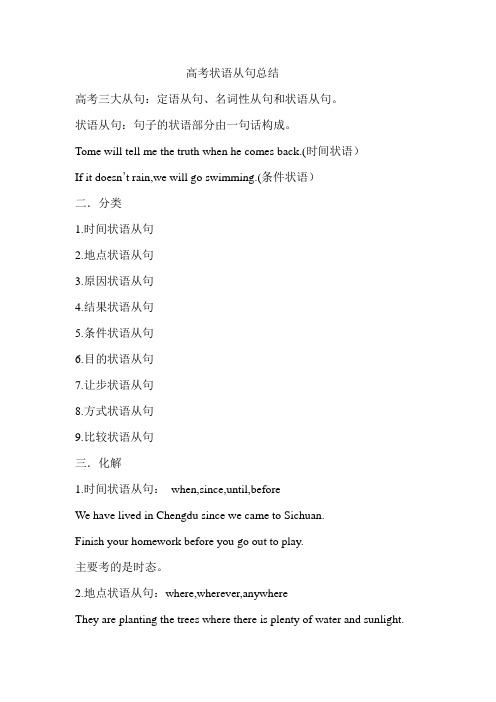
高考状语从句总结高考三大从句:定语从句、名词性从句和状语从句。
状语从句:句子的状语部分由一句话构成。
Tome will tell me the truth when he comes back.(时间状语)If it doesn’t rain,we will go swimming.(条件状语)二.分类1.时间状语从句2.地点状语从句3.原因状语从句4.结果状语从句5.条件状语从句6.目的状语从句7.让步状语从句8.方式状语从句9.比较状语从句三.化解1.时间状语从句:when,since,until,beforeWe have lived in Chengdu since we came to Sichuan.Finish your homework before you go out to play.主要考的是时态。
2.地点状语从句:where,wherever,anywhereThey are planting the trees where there is plenty of water and sunlight.Wherever you go , I will follow you.3.原因状语从句:because,as,for,sinceAs the weather was fine ,we decided to climb up the mountain.Since you have finished your work,let’s go now.4.结果状语从句:so...that,such...thatHe ran so fast that we couldn’t catch up with him.It is such fine weather that we decide to have a picnic.5.条件状语从句:if,unless,as long as,so long as,in case,providedAs long as he is alive,he will work.Take a taxi in case you are late for the class.6.目的状语从句:so that,in order thatHe spoke slowly so that everyone could understand him.You will need to study for many years in order that you may become a doctor.7.让步状语从句:although,though,as(although可放在句首,though不能放在句首)Although he was tired,he still kept working.8.方式状语从句:as,as ifIt looks as if it is going to rain.9.比较状语从句:as...as,thanThis machine is much heavier than that one.四.落地检验——高考真题__volleyball is her main focus,she is also great at basketball.A.SinceB.OnceC.WhileD.Unless___they decide which college to go to,students should research the admission procedure.A.AsB.WhileC.UntilD.OnceOnce bitten ,twice shy.一朝一朝被蛇咬,三年怕井绳。
高考英语语法:状语从句

高考英语语法:状语从句一.定义: 在句中作状语的从句就叫做状语从句二.分类: 状语从句包括以下八类1.时间状语从句: 由when, while, as, before, after, since, till / until, as soon as等引导a. I shall tell him the good news when he comes.2.原因状语从句: 由because, as, since, for等引导a. He didn’t hear me because he was listening to the radio.b. Since you are free today, you had better show me how to use the computer.3.地点状语从句: 由where等引导a. Please put the book where it was after you finish reading it.4.条件状语从句: 由if, unless等引导a. I will come to see you if I have time on Sunday.5.比较或方式状语从句: 由than, as, as if, as...as...等引导a. I know you do better th an he does.b. The old worker runs very fast as if he were a young man.6.目的状语从句: 由so that, in order that等引导a. They set out early so that they could arrive at the station in good time.7.结果状语从句: 由so, so that, so / such...that...等引导a. They set out early so that they arrived at the station in good time.b. He finished his work so well that the boss praised him in public.8.让步状语从句: 由though / although, even if, whatever, whoever, whenever, no matter what / who等引导a. He is in very good health though he is old.b. They didn’t stop working even if it began to rain hard.三.应注意的问题:1.时间和条件状语从句中常用一般时代替将来时a. I will go and see a film if I have time tomorrow.b. I will tell the about it as soon as he comes back.c. He said he would go out for a walk when he finished his work.2.状语从句中可有省略: 在一个含有状语从句的复合句中, 如果主句和状语从句的主语相同, 或状语从句的主语是it, 并且状语从句的谓语含有be动词时, 可以将状语从句的主语和be 一起省略掉a. As (she was ) a child, she began to learn English.b. If ( he was ) al ive, he must be at least ninety years old.c. Althou gh ( he was ) told to stop, he kept on working.d. If ( it is) necessary, ring me up.e. He didn’t say a single word unti l ( he was ) asked.3.as和than引导的比较状语从句中, 从句中和主句中相同的部分往往省略, 从句中只剩下比较对象a. He is a head taller than I ( am tall ).than之后的人称代词是主格或宾格时, 有时意思不同, 如:a. She likes the dog more than me.=She likes the dog more than she likes me.她喜欢狗比喜欢我更多b. She likes the dog more than I.=She likes the dog more than I like the god. 她比我更喜欢狗4.含有no soonerthan和hardly / barely / scarcely when的句子相当于含有as soon as引导的时间状语的句子.no sooner或hardly放在句首时, 主谓要部分倒装a. He had no sooner seen the policem an than he ran away. =No sooner had he seen the p oliceman than he ran away. =He ran away as soon as he saw the policemen.b. He had hardly sat down when the telephone rang. =Hardly had he sat down when the telephone rang. =The telephone rang as soon as he sat down.5.immediately, directly, instantly等词也可以作为连词引导时间状语从句, 相当于as soon as引导的时间状语a. I went to see him immediately I heard from him. =I went to see him as soon as I heard from him.6.the moment, the minute, the second引导时间状语从句, 相当于as soon as引导的时间状语a. He let out a cry the moment he saw the snake.=He let out a cry as soon as he saw the snake.7.each time, every time, any time, last time, next time, first time可以引导时间状语从句a. They shake hands with each other each time they meet.8.since引导的时间状语从句中, 若谓语动词是延续性动词或状态动词, 则其过去时表示动作的完成或状态的结束a. It is five years since he lived here. 他不住这里己有五年了a. They shake hands with each other each time they meet.8.since引导的时间状语从句中, 若谓语动词是延续性动词或状态动词, 则其过去时表示动作的完成或状态的结束a. It is five years since he lived here. 他不住这里己有五年了。
高考英语语法复习:八种状语从句的用法

高考英语语法复习:八种状语从句的用法状语从句状语从句有时间、地点、原因、目的、方式、结果、条件、让步等八种。
一、时间状语从句:引导词有after,before,as,once,since,till,until,when,whenever,while,as soon as,the moment/minute…(一…就),the time,the day,every time,next time,each time,by the time of,no sooner…than(一…就),hardly…when(一…就).例如:Each/Every time he comes here,he will drop in on me.每次他来这儿他都顺便看我.He was ill last time I saw him.上次我见到他时他病了.No sooner had she heard the news than she cried.她一听到这个消息就哭了.[辨析]when与whilewhen引导的从句动词可以是延续性的或短暂性的,while引导的从句中动词必须是延续性的;在“be…when…”句式中when表“at that time(就在这时)”意,这样用的when不能换为while;while有时并不表示时间,而表示对比,意“而”、“却”,when无这样的用法。
例如:When I got home I found the door locked./While(或When)we were working in the fields,it suddenly began to rain./He was wandering through the streets when a bike hit him./His pencil is red,while mine is yellow.[辨析]till与until一般情况下可以互换,但until可以位于句首,till则不能。
高考英语复习 状语从句讲解
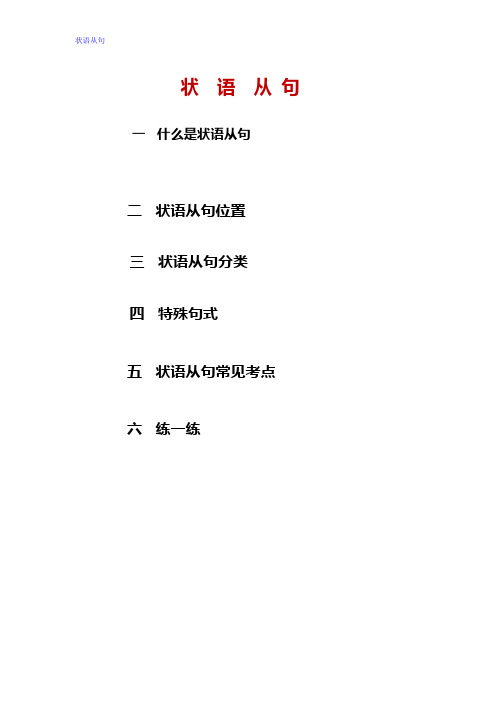
状语从句状语从句一什么是状语从句二状语从句位置三状语从句分类四特殊句式五状语从句常见考点六练一练一什么是状语从句状语从句是行使状语功能的从句,因为其作用相当于副词,它可以用来修饰谓语、定语、状语或整个句子。
状语从句通常由一个连接词或起连接词作用的词组引导。
二状语从句位置比较灵活,有时可以放于句首,有时可以置于句末。
状语从句位于句首时,其后常用逗号与后面的句子隔开。
三状语从句分类让步状语though, although, even though, while whether ,whoever/no matter who ,whatever/ n o m atter w hat ,whenever/ no matterEven t hough y ou s ay s o, I d o n ot believe it.比较状语 than as …as ,the more … the moreThe m ore I s ee him , t he l ess I l ike h im. 方式状语as, as if , as thoughHe t old m e e verything a s i f I w ere h isbest friend.四 特殊句式时间状语中 A:It + b e +时间点+ w hen …… 当某事发生时是什么时候It was 11:00 PM when he came back last night.B:It i s/has b een +时间段 + s ince …… 自从某事发生后已过了多久时间It i s /has b een t wo y ears s ince I e ntered t he t he s enior s chool.C:It + be +时间段 + before …… 在某事发生之前需要多久时间It was 8 years before we finally drove away the Japanese invaders. It m ight b e a l ong t ime b efore C hinese l and o n t he m oon.让步状语从句A: as 引导的让步状语从句, 从句的表语、状语必须前置到句首。
高考英语总复习 语法突破篇 第五讲 状语从句

should/might/could+动词原
形
状语从句类 型及其从属
连词
结 so 果 that; 状 so... 语 that; 从 such... 句 that
要点归纳
1.so that引导结果状语从句 时,一般不用情态动词 can,could等 2.在so...that...结构中,so 是副词,只能修饰形容词 或副词;而such...that...结 构中,such是形容词,修饰 名词或名词词组。但so还可 以与表示数量的many, few,much,little连用,形 成固定搭配 3.当so或such置于句首 时,主句要用倒装语序
条 件 状 语 从 句
long as;once;in case;on
condition that; supposing(that); suppose(that); provided(that);
在条件状语从 句中,用一般 现在时代替一 般将来时,一 般过去时代替 过去将来时
providing(that)
The moment I saw it,I fell in love with it. He rushed upstairs immediately he heard a loud noise. No sooner had he reached home than it began to rain.
not...until句式中until引导的从句进 that we began to go
行强调时,要将not与until放在一 home.
起进行强调
Until you told me I had
4.till不可以置于句首,而until可 no idea of it.
(完整版)高考英语专题复习状语从句(附答案)

高考英语专题复习状语从句(附答案)I. 考点分析状语从句可用来表示时间、地点、原因、目的、结果、条件、方式、比较和让步等。
1.时间状语从句1) 常见关联词有when, whenever, while, as, before, after 等。
2)注意not…until… 正常结构、倒装结构、强调结构、和until置于句首的用法。
He didn’t go to sleep until he had finished his homework. (正常结构)Not until he had finished his homework did he go to sleep. (倒装结构)It was not until he had finished his homework that he went to sleep.(强调结构)Until he had finished his homework he didn’t go to sleep. (until置于句首)3)表示“一……就……”的连词:once, as soon as, hardly/scarcely…when, no sooner…than, the minute, the moment, the instant, immediately, directly, instantly4)其他表示时间的短语还有:every time, next time, the day 等。
2.地点状语从句通常由where, wherever引导如:Where there is a will, there is a way.3.原因状语从句1) 通常由because, as ,since引导, 三者区别:because 语气最强,重在交待原因,以why引导的疑问句只能because用来回答;其前可用only, just等词强调;可用在It is…that…强调句型中。
高考英语 第十四章 状语从句知识精讲
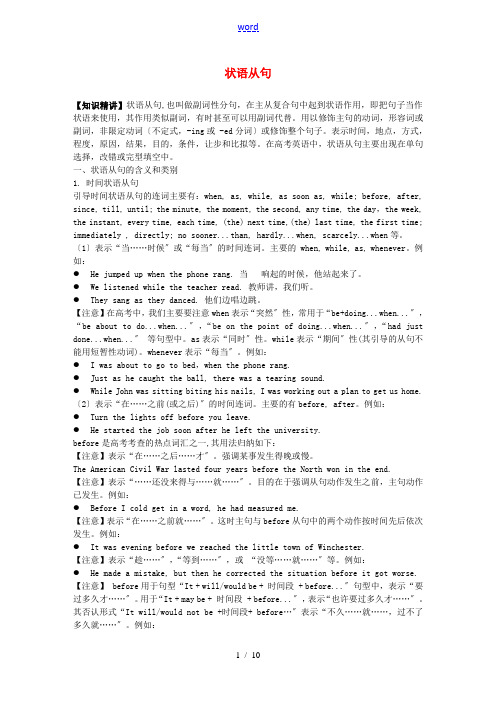
状语从句【知识精讲】状语从句,也叫做副词性分句,在主从复合句中起到状语作用,即把句子当作状语来使用,其作用类似副词,有时甚至可以用副词代替。
用以修饰主句的动词,形容词或副词,非限定动词〔不定式,-ing或 -ed分词〕或修饰整个句子。
表示时间,地点,方式,程度,原因,结果,目的,条件,让步和比拟等。
在高考英语中,状语从句主要出现在单句选择,改错或完型填空中。
一、状语从句的含义和类别1. 时间状语从句引导时间状语从句的连词主要有:when, as, while, as soon as, while; before, after, since, till, until; the minute, the moment, the second, any time, the day,the week, the instant, every time, each time, (the) next time,(the) last time, the first time; immediately , directly; no sooner...than, hardly...when, scarcely...when等。
〔1〕表示“当……时候〞或“每当〞的时间连词。
主要的 when, while, as, whenever。
例如:●He jumped up when the phone rang. 当响起的时候,他站起来了。
●We listened while the teacher read. 教师讲,我们听。
●They sang as they danced. 他们边唱边跳。
【注意】在高考中,我们主要要注意when表示“突然〞性,常用于“be+doing...when...〞,“be about to do...when...〞,“be on the point of doing...when...〞,“had just done...when...〞等句型中。
第十三章状语从句含例题和习题课件高考英语语法总复习

(三)原因状语从句
原因状语从句是表示原因或理由的,引导这类从句的最常用的 连词是because, since, as , now that(既然)等,for 表示因果关系时 (它引导的不是从句)为并列连词,语气不如because强。 如:He is disappointed because he didn't get the position.
You may borrow the book so long as you keep it clean. So far as I know(据我所知), he will be away for three months. You can go swimming on condition that ( = if ) you don't go too far away from the river bank. If he had come a few minutes earlier, he could have seen her.
例4 Don’t put too much pressure on yourself.
will achieve your goal in the future.
A. In case B.Even though C.As long as
you keep trying, you D.As soon as
cause other family problems. A. When B. While C. If D. As
【答案】B。 【解析】while表“虽然,尽管”,引导让步状语从句。句意:虽 然因特网架起了人与人之间的桥梁,但是它也可能导致一些其他的 家庭问题。 【点评】考查状语从句。
高考英语状语从句的用法归纳
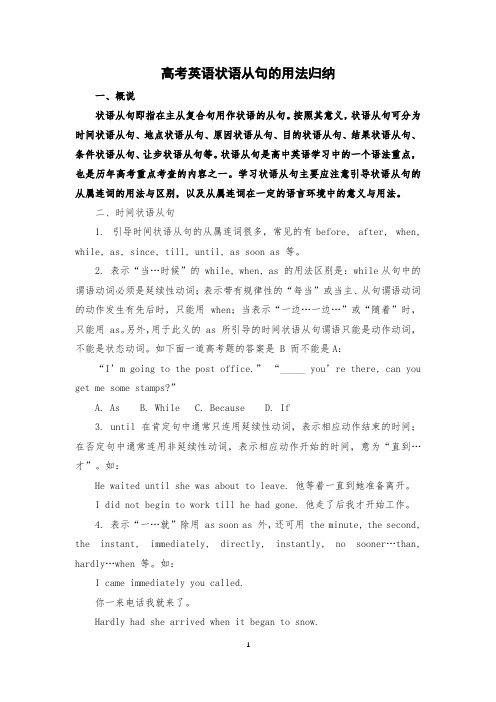
高考英语状语从句的用法归纳一、概说状语从句即指在主从复合句用作状语的从句。
按照其意义,状语从句可分为时间状语从句、地点状语从句、原因状语从句、目的状语从句、结果状语从句、条件状语从句、让步状语从句等。
状语从句是高中英语学习中的一个语法重点,也是历年高考重点考查的内容之一。
学习状语从句主要应注意引导状语从句的从属连词的用法与区别,以及从属连词在一定的语言环境中的意义与用法。
二、时间状语从句1. 引导时间状语从句的从属连词很多,常见的有before, after, when, while, as, since, till, until, as soon as 等。
2. 表示“当…时候”的 while, when, as 的用法区别是:while从句中的谓语动词必须是延续性动词;表示带有规律性的“每当”或当主、从句谓语动词的动作发生有先后时,只能用 when;当表示“一边…一边…”或“随着”时,只能用 as。
另外,用于此义的 as 所引导的时间状语从句谓语只能是动作动词,不能是状态动词。
如下面一道高考题的答案是 B 而不能是A:“I’m going to the post office.” “_____ you’re there, can you get me some stamps?”A. AsB. WhileC. BecauseD. If3. until 在肯定句中通常只连用延续性动词,表示相应动作结束的时间;在否定句中通常连用非延续性动词,表示相应动作开始的时间,意为“直到…才”。
如:He waited until she was about to leave. 他等着一直到她准备离开。
I did not begin to work till he had gone. 他走了后我才开始工作。
4. 表示“一…就”除用 as soon as 外,还可用 the minute, the second, the instant, immediately, directly, instantly, no sooner…than, hardly…when 等。
高中英语2025届高考语法复习状语从句知识讲解

高考英语语法复习状语从句知识讲解一、概述常见的有although/though/even though引导的让步状语从句。
if/unless引导的条件状语从句。
until/when/while/as soon as引导的时间状语从句。
because引导的原因状语从句,so that引导的目的状语从句等。
if引导的条件状语从句和when引导的时间状语从句一般都会和时态相结合,即主要考查“主将从现”原则。
对于状语从句的学习可与专题六从属连词相结合。
在时间状语从句和条件状语从句中,主句和从句的时态一致问题一般有两种情况:(1)“主将从现”:主句用一般将来时,而从句用一般现在时。
常见的使用“主将从现”原则的连词有:表示时间的when, while, after, before, until, till, whenever, as soon as, as long as, once 等;表示条件的if, unless, so long as, in case等。
(2)“主祈从现”:若主句是祈使句,或主句中有情态动词时,那么从句用一般现在时表示将来。
(3)“主情从现”:若主句有情态动词, 那么从句用一般现在时表示将来。
如:You can get good grades if you study hard.如果你努力学习,你将取得好成绩。
状语从句由从属连词引导,与主句连接,位于句首时,常用逗号与主句分开,位于句末时,其前一般不用逗号。
状语从句根据其用途可分为时间状语从句、条件状语从句、原因状语从句、目的状语从句、结果状语从句、让步状语从句、比较状语从句、地点状语从句等。
二、时间状语从句(1)当主句是一般将来时态或祈使句,表示将来的意义时,从句通常用一般现在时,简称“主将从现”。
I’ll ring you up as soon as I get to Beijing.我一到北京就给你打电话。
(2) when引导的时间状语从句,通常表示主句和从句的动作同时发生;before表示主句的动作发生在从句的动作之前;after则表示主句的动作发生在从句的动作之后;as引导时间状语从句时,往往表示主句和从句的动作同时发生,不分先后。
高考 英语 状语从句

状语从句:1.什么是状语从句和状语从句?状语是一个辅助成分,对句子起到一个辅助说明作用,说明动作发生的状况:通俗地说一个动作或一个状态发生的在什么时间、地点、为什么、怎么样等等。
副词、形容词、介词短语、非谓语以及句子等均可做状语。
用句子充当的状语就是状语从句。
表时间为时间状语从句,地点、原因等构成相应的从句。
Every day, he studied hard in this room through the computer in order to learn English well.When he was young, he studied English hard where he lived through the computer in order that he could learn English well.特殊规定在时间、条件、让步、方式状语从句中,用一般现在时态代替将来时态,用现在完成时态代替将来完成时态。
这就是所谓的主将从现2.做题的难点在于分析主句与从句之间的逻辑关系。
3.具体分析。
1. 时间状语从句注意问题: ① when, while, as 的用法区别:② when 的不同含义e.g. It is foolish of you to take a taxi when you could walk there easily. ③ before多久以后④ since;It be +时段+ since⑤倒装式:Not until he arrives will I leave.强调式:It is not until he arrives that I leave.⑥ “一……就……”的多种表达方式:2.地点状语从句: where, whereverWhere 在定语从句和状语从句中的区别e.g. We should make a mark where we have a question.3. ①②even if / though③以上二者的区别④whether……or (not)……4. 原因状语从句because / as / since / now that/(for) 为并列连词,引导的句子不能前置。
- 1、下载文档前请自行甄别文档内容的完整性,平台不提供额外的编辑、内容补充、找答案等附加服务。
- 2、"仅部分预览"的文档,不可在线预览部分如存在完整性等问题,可反馈申请退款(可完整预览的文档不适用该条件!)。
- 3、如文档侵犯您的权益,请联系客服反馈,我们会尽快为您处理(人工客服工作时间:9:00-18:30)。
状语从句在高考试题中由于其他从句的干扰,以及倒 装句,强调句的介入,使得状语从句更为复杂。状语从句 是一种副词性从句,通常由一个从属连词或一个起连词作 用的词组引导。
1. 时间状语从句 常见的连词(组):
when, while, as, before, after, once, till, until, as soon as, n, scarcely ...when, no sooner ...than等。
It wasn t long before he told me about the news. 没多久他就告诉了我那条新闻。 ② 不等……就……; 在……之前就…… The telephone rang off before I could answer it. 我还没来得及接电话,电话就挂断了。 ③ 刚……就…… He hardly entered the room before he heard the telephone ring. 他刚进屋电话铃就响了。 ④ 先……再…… You can have a few days to think about it before you make your decision. 做决定之前你还有几天时间考虑。
注意点如下: (1) when, while, as引导的时间状语从句 as表示“当……的时候”,往往和when/ while通用,但它着重强调主句与从句 的动作或事情同时或几乎同时发生。when(at or during the time)既可以表示在某 一点的时候,又可以表示在某一段时间内,主句与从句的动作或事情可以同时发生 也可以先后发生。while强调一段时间,仅表示从句和主句的动作同时发生,并且有 延续意义,该从句中的动词一般要用延续性动词,从句中常用过去进行时态或一般 过去时态;当when表示a period of time时,两者可以互换。 She came up as I was cooking.(同时) 在我做饭时,她走了过来。 When we were at school, we went to the library every day.(在一段时间内) 当我们在学校时,每天都去图书馆。
可以引导时间状语从句的副(介)词(短语)或名词短语:
directly, instantly, immediately, by the time, the moment, the second, the minute, the instant, every time, each time, next time, the last time等。
2. 原因状语从句 引导原因状语从句的常见连词或短语:as, because, since, now that, considering that, seeing that(鉴于……)。注意以下几点:
(1) because, since, as, for, now that because语气最强,用于回答why的提问,可与强调词only, just 以及否定词not 连用。但不可以与so连用。 since 引导的从句语气次于because引导的从句,常表示稍加分析后而推断出的 原因,或指人们已知的事实,比as正式一些,常置于句首。 as 语气最弱,其原因只是对结果的附带说明,一般放在句首。 for虽然解释为“因为”但只是一个并列连词,它也常引导句子表示原因,但不是原 因状语从句,它是一个并列句。for所提供的理由是一种补充性的说明,表示推测的 理由。 now that意为“既然,由于”。表示由于人们已知的事实或正在发生的事而产生某 个结果。 He failed because he was careless.他因粗心而失败了。
He has never been to see me since I have been ill. 我病了,他一直未来看我。
I haven t heard from him since he lived here. 自他从这里搬走,我就没有收到他的信。(不住在这儿了)
(4) till, until 如果till与until用在肯定句中时,则主句中谓语动词部分 所表示的动作或状态一直延续到某时或某个动作发生时才结 束。注意它的倒装句和强调句。 I didn t recognize she was my classmate until she took off her dark glasses. =Not until she took off her dark glasses did I recognise she was my classmate =It was not until she took off her dark glasses that I recognised she was my classmate. 直到她摘下墨镜,我才认出她是我的同学。
(3)since 引导的从句用延续性动词的过去式(包括过去完 成时)时,则从句的动作已经结束,从句意思是否定的。如果 从句的动词是延续性动词的现在完成时态,则从句意思是肯定 的。
He has never been to see me since I was ill. 我病愈后,他一直未来看我。(不再生病了)
是“趁……”)
(2) before引导状语从句时的常见重点句型 ①It will (not) be ...before ... 还要……才,要不了多久就…… It was (not) ...before ... 过了……才(没多久就……) It was a long time before I got to sleep. 过了好长时间我才睡着了。
While they were watching TV, I was preparing myself for the coming
examination. 他们在看电视,而我在为即将到来的考试做准备。 Strike while the iron is hot. 趁热打铁。 ( 不可用as或when,这里的while意思
